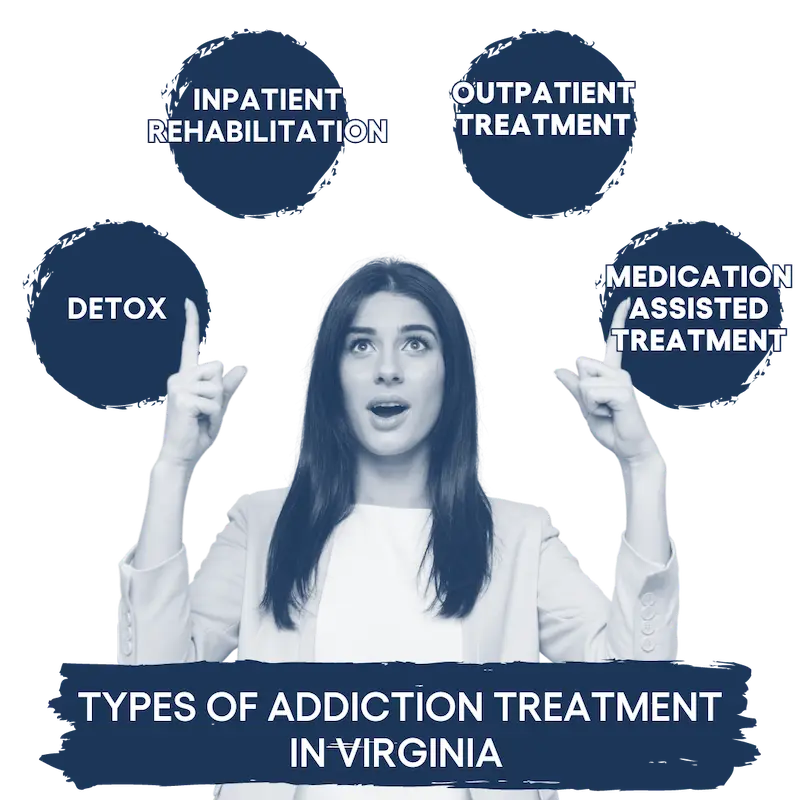If you are in Virginia and need help with drug and alcohol addiction – call (704) 248-8561.

Virginia, also known as “The Old Dominion State,” shares the same love for cardinals and flowering dogwoods that North Carolina does. Dubbed “For Lovers,” Virginia is a popular tourist destination, but despite all of this, residents of Virginia still face struggles with addiction and mental health disorders. These disorders may include depression, anxiety, bipolar disorder, PTSD, and addictions to drugs and alcohol.
Virginia cities offer a range of substance abuse treatment options for those who are struggling with drug and alcohol addiction. This Virginia recovery center treatment guide for drug and alcohol addiction offers guidance, community-based support, recovery program opportunities, and more – aiding in long-term sobriety.
Virginia offers a variety of addiction treatment options to cater to the diverse needs of individuals seeking recovery from substance abuse. These treatments range from medical detoxification to long-term residential programs, providing comprehensive care for different levels of addiction severity. Here are the main types of addiction treatment available in Virginia:

When selecting a drug and alcohol treatment center in Virginia, it's essential to consider several factors to ensure you or your loved one receives the best care possible. Here are ten key aspects to look for:
Ensure the treatment center is accredited by reputable organizations such as the Joint Commission or CARF (Commission on Accreditation of Rehabilitation Facilities) and licensed by the state of Virginia. Accreditation ensures the facility meets high standards of care and professionalism.
A quality treatment center will conduct a thorough assessment to understand the individual’s specific needs and develop a personalized treatment plan. This plan should address the unique circumstances of each patient, including any co-occurring mental health disorders.
Look for centers with a team of qualified professionals, including licensed therapists, counselors, medical doctors, and nurses. Staff experience and expertise in addiction treatment are crucial for effective care.
The best centers offer a variety of treatment options, including medical detoxification, inpatient and outpatient programs, medication-assisted treatment (MAT), and holistic therapies. A comprehensive approach ensures that all aspects of addiction are addressed.
Ensure the center utilizes evidence-based therapies such as Cognitive Behavioral Therapy (CBT), Dialectical Behavior Therapy (DBT), and Motivational Interviewing (MI). These therapies have been proven effective in treating addiction.
A good treatment center will provide robust aftercare and relapse prevention plans. This includes ongoing therapy, support groups, and resources to help individuals maintain their sobriety after completing the program.
Effective treatment often involves family therapy and support. Look for centers that encourage family participation and offer resources to help families understand addiction and support their loved one’s recovery.
Consider centers that offer holistic and alternative therapies, such as yoga, meditation, art therapy, and equine therapy. These therapies can complement traditional treatments and help address the physical, mental, and spiritual aspects of recovery.
Research reviews and testimonials from former patients and their families. Positive feedback can provide insight into the center’s effectiveness and the quality of care provided.
The location and environment of the treatment center can significantly impact recovery. Consider centers that offer a peaceful, supportive setting conducive to healing. The facility should also be accessible to family members who may want to participate in the treatment process.

Virginia offers a wide range of resources to support individuals struggling with mental health issues and addiction. These resources include state programs, community services, and non-profit organizations dedicated to providing comprehensive care and support.
Virginia Department of Behavioral Health and Developmental Services (DBHDS) – The DBHDS oversees the public mental health, intellectual disability, and substance abuse services system in the state. It provides resources, information, and support for individuals and families dealing with mental health and addiction issues.
Mental Health America of Virginia (MHAV) – MHAV is a statewide non-profit organization that promotes mental health and wellness through education, advocacy, and support services. It offers resources for individuals seeking help for mental health issues.
SAMHSA National Helpline – Confidential, free help from public health agencies to find more information on addiction and mental health resources.
Southeastern Recovery Center – Drug and Alcohol Addiction Treatment Programs that cater to unique individual needs.

Virginia saw an increase in drug overdose deaths from 970,000 in 2011 to 3,050,000 in 2021. In 2021, the number of opioid overdose deaths totaled 2,230, accounting for 85% of all drug overdose deaths in the state.
When it comes to mental health, 1,115,000 adults in Virginia struggle with mental health conditions. In February 2021, 36.9% of Virginia adults reported symptoms of anxiety and depression – but many of them were unable to get treatment (22.2%). With the increased need for dual diagnosis treatment, it is more important than ever for Virginia to build a stronger mental health system that provides care, support, and services that are needed for state residents.
Gaining a better understanding of state statistics on drug and alcohol addiction, including mental health statistics can shed light on the prevalence and impact of substance abuse. These statistics can be used when making policy decisions, resource allocation, and community interventions aimed at addressing addiction issues.
Virginia has many activities that are perfect for those seeking sober entertainment and recreation. From outdoor adventures to cultural experiences, there are plenty of ways to enjoy the beauty and culture of the state without the influence of alcohol or drugs. Here are some popular sober activities in Virginia:
Shenandoah National Park: offers stunning views along the Appalachian Trail.
Virginia Beach: a popular destination for sunbathing, swimming, and beachcombing.
Virginia Museum of Fine Arts (VMFA): offers extensive collections of fine art and is located in Richmond, VA.
Salamander Resort & Spa – offers luxurious treatments and serene settings perfect for a sober getaway.
Virginia Film Festival – program of the University of Virginia that is held annually.

Paying for addiction treatment in Virginia can be a significant concern for many individuals and families. Fortunately, there are various options and resources available to help cover the costs. Here are some ways to pay for addiction treatment in Virginia:

Many private health insurance plans cover addiction treatment services, including detoxification, inpatient and outpatient rehab, and therapy. It's essential to check with your insurance provider to understand the extent of your coverage, what services are included, and any out-of-pocket costs you may incur.

A sliding fee schedule is a payment model used by many addiction treatment centers to make their services more affordable and accessible. This model adjusts the cost of treatment based on an individual's ability to pay, considering factors such as income, family size, and financial resources.

Many addiction treatment centers offer payment plans or financing options to help manage the cost of treatment. This can include spreading payments over time or accessing third-party financing services that specialize in healthcare costs. It's advisable to discuss these options directly with the treatment center.
When considering getting help for drug or alcohol addiction, the expense of treatment should be the last concern on you or a loved ones mind. We offer free insurance verification along with transportation assistance to our rehab facility. Allow us to handle the financial details while you focus on what matters, getting well!
Virginia offers a range of addiction treatment programs, including detoxification, inpatient and outpatient rehabilitation, medication-assisted treatment (MAT), therapy and counseling, and aftercare support. Specialized programs for dual diagnosis, adolescents, and gender-specific treatment are also available.
Inpatient treatment requires patients to stay at the facility 24/7, providing a structured and immersive environment for recovery. Outpatient treatment allows patients to live at home while attending scheduled therapy sessions and medical appointments.
Check if the treatment center is accredited by organizations such as the Joint Commission or CARF (Commission on Accreditation of Rehabilitation Facilities). Accreditation ensures the facility meets high standards of care and professionalism.
The intake process typically involves an initial assessment to determine the patient's specific needs, medical history, and substance use history. This information helps create a personalized treatment plan.
Yes, many health insurance plans cover addiction treatment services. It's important to verify with your insurance provider what specific treatments and services are covered and any out-of-pocket
Common therapies include Cognitive Behavioral Therapy (CBT), Dialectical Behavior Therapy (DBT), Motivational Interviewing (MI), individual therapy, group therapy, and family therapy.
Holistic treatment options can include yoga, meditation, art and music therapy, equine therapy, and other activities that address the physical, mental, and spiritual aspects of recovery.
The duration of treatment varies depending on individual needs and the type of program. Detox may last a few days to a week, inpatient programs typically last 30-90 days, and outpatient programs can last several months to over a year.
Aftercare support can include ongoing therapy, support groups, sober living homes, and relapse prevention planning to help individuals maintain their sobriety and transition back into everyday life.
